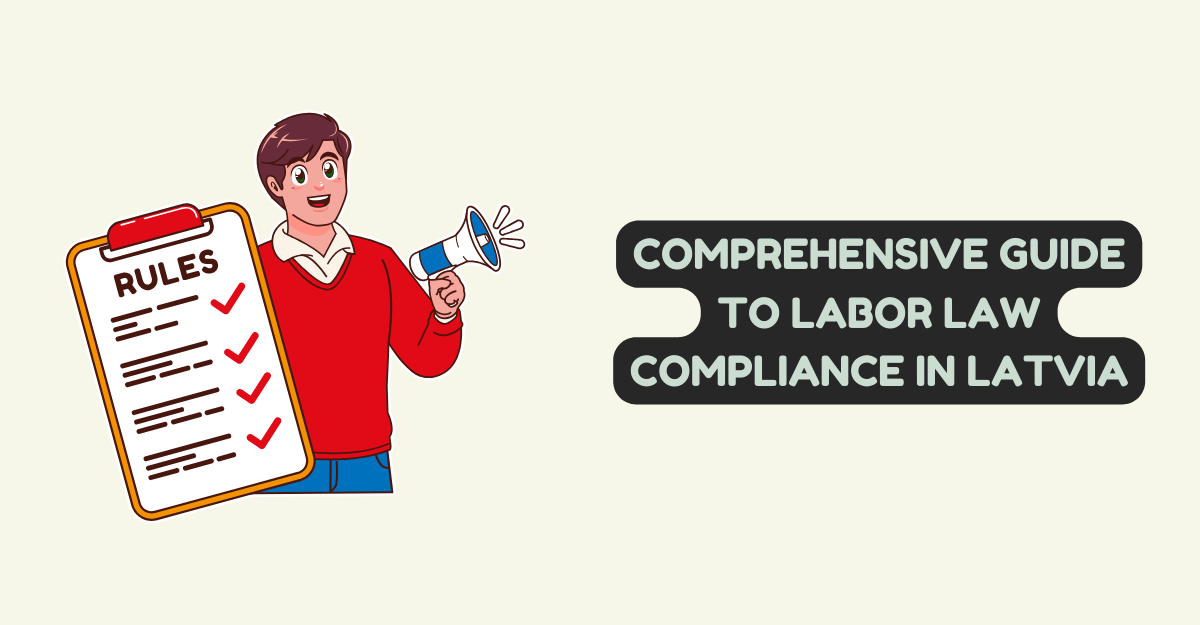Education
Comprehensive Guide to Labor Law Compliance in Latvia
Published
3 weeks agoon

Comprehensive Guide to Labor Law Compliance in Latvia
Labor law in Latvia encompasses a comprehensive regulatory framework that outlines the rights and obligations of both employers and employees. Mastery of this framework, including drafting precise employment agreements, managing employee relocations, and effective representation in court proceedings, is essential for legal compliance and maintaining a productive workplace environment.
1. Drafting Employment Agreements and Internal Regulations
- Latvian Labour Law (Darba likums): Provides the legal basis for employment agreements and workplace regulations.
- Sections 45-49: Mandate that employment contracts explicitly detail job descriptions, salary, working hours, and terms of employment termination to prevent disputes and ensure transparency.
- Section 29: Requires that employers’ internal regulations align with national employment standards on workplace safety, employee duties, disciplinary procedures, and work schedules, ensuring comprehensive communication to all employees.
2. Legal Support in Relocation of Employees
- Governing Laws:
- Labour Law: Outlines the general employment rights and responsibilities.
- Immigration Law (Imigrācijas likums), Sections 23-26: Specifies the procedures for obtaining work permits and residency for foreign employees.
- EU Regulations: Provide additional context and requirements for employee relocation within the EU.
- Role of Legal Experts: Crucial in navigating these laws to ensure seamless integration of relocated employees into the local workforce while adhering strictly to legal requirements.
3. Representation in Court Proceedings
- Labour Law Provisions:
- Sections 100-107: Address legal remedies and procedures in cases of wrongful termination.
- Sections 7-8: Focus on anti-discrimination measures and equal treatment in the workplace.
- Importance of Legal Representation: Experienced attorneys at law and lawyers are vital, leveraging in-depth knowledge of these provisions to effectively advocate for their clients’ rights in court and secure favorable outcomes.
4. Challenges and Considerations in Labor Law
- Navigating a Dynamic Legal Environment:
- Frequent Legislative Updates: Latvian labor law is subject to frequent changes and amendments, which can introduce new compliance challenges for employers. These changes are often driven by both local legislative initiatives and EU directives that impact various aspects of employment law, including minimum wage regulations, working conditions, and employee rights.
- Example: Recent amendments to the Labour Law introduced changes in parental leave policies, requiring employers to adjust their existing employment policies and agreements to remain compliant.
- Proactive Management Strategies:
- Continuous Legal Education: It’s crucial for employers and HR professionals to stay updated with the latest changes in labor laws. Regular training sessions, workshops, and legal briefings can help maintain an informed management team that is capable of adapting to new legal requirements.
- Implementation of Robust HR Policies: Developing and regularly updating HR policies in accordance with the latest labor laws is essential. These policies should cover areas such as discrimination, harassment, workplace safety, and employee grievances to ensure a comprehensive and legally compliant approach to workforce management.
- Legal Compliance Audits: Periodic audits of employment practices and policies can help identify potential areas of non-compliance before they become problematic. These audits should be conducted by legal experts or specialized compliance officers.
5. Legal Examples and Specific Laws
- Example Case: Illustrate a case where non-compliance with Section 48 of the Labour Law led to legal challenges over unfair dismissal claims.
- Specific Laws Referenced:
- Labour Law, Section 48: Details the procedures and legal standards for fair dismissal.
- Regulation of the Cabinet of Ministers No. 151: Provides detailed guidelines on the formation and enforcement of employment contracts.
Final Thoughts on Navigating Labor Law in Latvia
Labor law in Latvia demands a thorough understanding and careful management of legal responsibilities by employers. Law firms play an indispensable role in this process, ensuring that employment practices not only comply with legislative mandates but also support the best interests of both employers and employees. Effective legal support in drafting agreements, managing relocations, and litigating disputes is crucial for safeguarding rights and promoting a stable, productive workplace.

Trending

 Banco4 years ago
Banco4 years agoBanjercito

 Gaming3 years ago
Gaming3 years agoNBA 2K21 Best Controller Settings

 Social Media3 years ago
Social Media3 years agoHow to prepare a publication schedule

 Indonesia4 years ago
Indonesia4 years agoSerial Number CorelDraw X7 Aktivasi Kode 64/32 Bit | Dijamin Bisa

 Filmora4 years ago
Filmora4 years agoWondershare Filmora 9 Activation Key and Email Free 2020

 Education1 year ago
Education1 year agoJuan Monteverde on the Unexpected Costs of Corporate Fraud

 Indonesia3 years ago
Indonesia3 years agoMangastream – 15 Alternatif Terbaik untuk Membaca Manga Online [2021]

 Education4 years ago
Education4 years ago28 Best Bane Quotes From The Movie “The Dark Knight Rises”
You must be logged in to post a comment Login